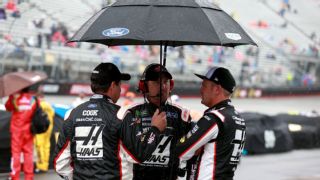|
NASCAR teams understand that the nature of outside sporting events dictates that inclement weather can force them to compete a day (or even two) later than scheduled. When it happens, logistics can be more of an issue than the cost of having personnel at the track for an extra day. Considering that a wrecked race car can be a six-figure expense if the car and engine are totaled, the $5,000 to $10,000 a team spends to remain an extra day doesn't make too many owners blink. "We base our initial budget on previous year's spending, so there's a rainout or two in there," said JTG Daugherty Racing owner Tad Geschickter. At Bristol Motor Speedway in Tennessee, the race was suspended last week during the Monster Energy NASCAR Cup Series Food City 500 and the weather forecast was dire. Geschickter already had booked rooms for his two-car team. Race teams often have relationships with hotels, and Geschickter could get a 6 p.m. cancellation, so when Chris Buescher crashed Sunday and was already out of the race, Geschickter canceled eight of his hotel rooms. Hotels, a few rental cars and an extra day of per diem are the primary costs for a team, and six team owners estimated those costs at from $5,000 to $10,000 per car. Most teams fly charter, and one charter company offered a deal that made it more economical for the teams to take the 20-minute flight from Bristol to Charlotte, North Carolina, rather than pay for hotels. "It's just part of the sport," Roush Fenway Racing president Steve Newmark said. "It's not like when there's a rainout we agonize about additional cost. That is part of what happens." One owner who did agonize was Carl Long, who was at Bristol for his first Cup race since Daytona. Tennessee driver Chad Finchum had brought some sponsorship, but the car suffered damage. Long didn't budget the extra $7,000 he estimated it cost. "The budget was there to cover [the damage]," Long said. "So I won't be fixing the car as quick to do what I've got to do." If a team doesn't own a pit crew and leases it from another team, typically the team is not charged for the extra day. Sponsors, who obviously hope for strong attendance and television ratings, also understand there will be rainouts, Newmark said, but he wants a rainout to be considered for a potential night race in prime time. He said Bristol would have been the prime opportunity to try it, especially when it is so close to the teams' home base. NASCAR did not consider running Monday night. For the fans who are at the track, NASCAR often tries to get the race in the late morning or early afternoon the next day so they can travel home that day. "I would love to use a rainout opportunity to have a prime-time race," Newmark said. "That's something that I'll continue to advocate for." Rainouts affect the business side of the sport mostly at the track. It is estimated a track will see a 10 percent drop in ticket renewals in the year after a rainout. "The biggest thing is just the effect on our fans," said Speedway Motorsports Inc. president Marcus Smith, whose company owns Bristol Motor Speedway. "The fans and the sponsors that are here [have] the biggest disappointment. That's our biggest cost. "People are discouraged. You don't have as many great, fond memories when it's raining and cold." A few tracks offer ticket exchanges if the race is postponed for a day and a fan cannot come on the day the race is run. Some use insurance policies to cover those costs, others do not. Smith said that by having various activities and fan access to events and drivers on a race day, tracks hope the ticket value goes beyond the actual race itself. Heavy rains can also damage parking areas, and adding gravel to parking lots or replacing the grass in grass lots can be one of the biggest expenses for track owners. With Bristol being a half-mile track and 670-acre facility, as compared with SMI's 1,490-acre facility at Texas, the costs can be different. If there is enough rain to cause flooding in campgrounds, that also can have an impact. At Bristol, with the forecast for rain, Smith said staffing was adjusted for Sunday and Monday. "The threat of rain stinks," Smith said. "It really sours the whole race week. The actual rain is even worse. We're always looking to pack more value into a race ticket. ... Our whole team has been working for a year to build this big event, so it's disappointing. "You have to keep going. The show must go on."
|

